The Last Laugh
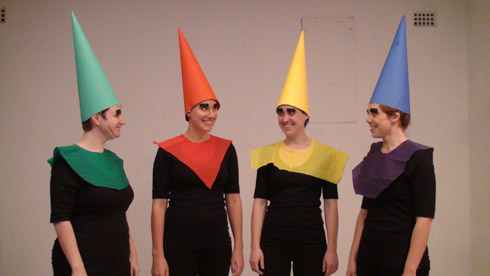
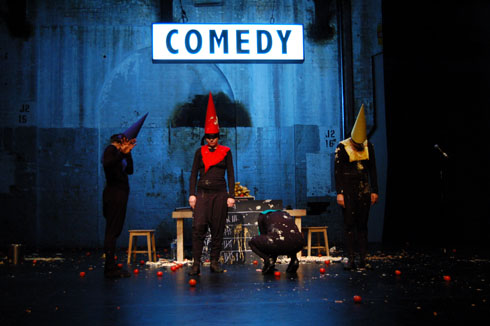
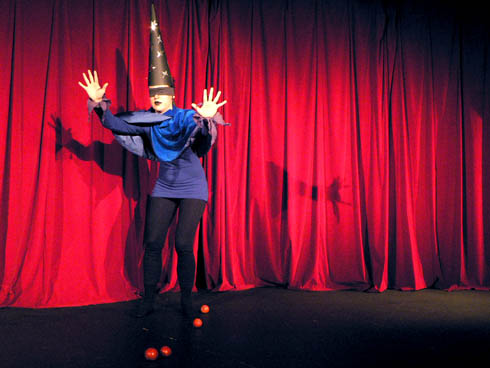
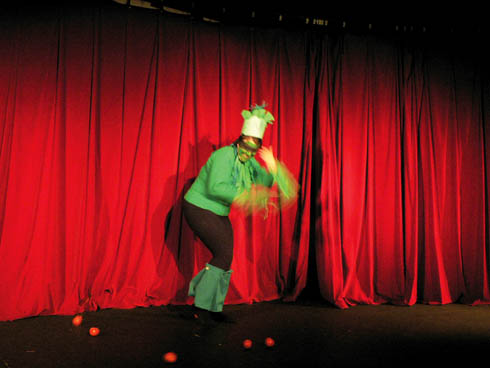
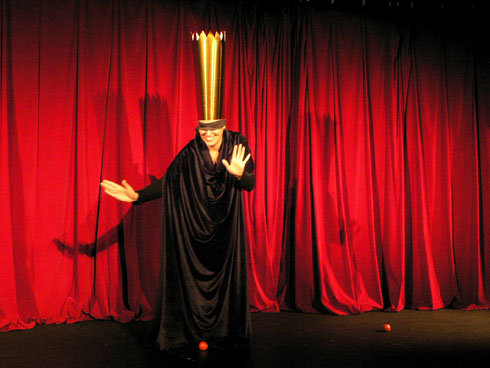
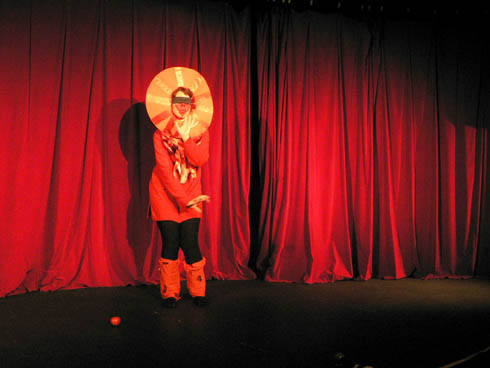
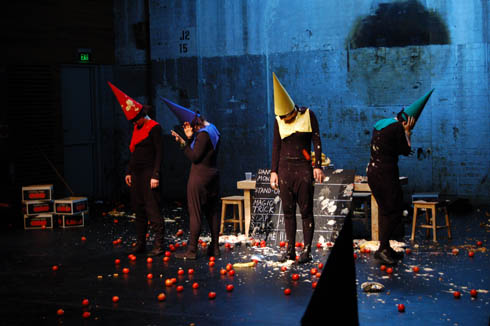
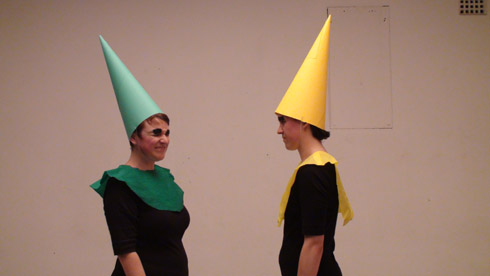
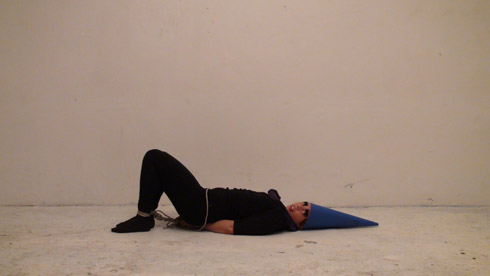
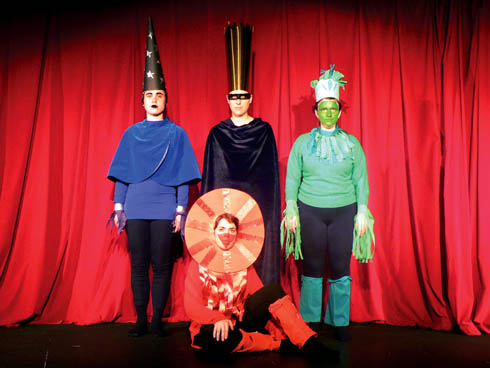 Text: Eddie Sharp Images: Brown Council
Text: Eddie Sharp Images: Brown Council
On 20th March 2011, Brown Council showed up at Goodgod Small Club to perform in Cab Sav, the short works finale of The Imperial Panda Festival. They looked tired and disheveled. One member of the group was wearing a neck brace; another had a black eye.
The previous night had been the final outing of their show ‘A Comedy’: a four-hour endurance performance framed as a variety night. Fran Barrett, Kate Blackmore, Kelly Doley and Diana Smith spend the duration performing bad stand-up comedy, hurling cream pies at each other, binge-eating seven bananas at a time, slapping each other till they are red in the face, begging the audience for money and allowing themselves to be relentlessly pegged with tomatoes while blindfolded. These are the only actions, chosen and repeated at the whim of the audience’s vote to a constant soundtrack of canned laughter and comedy club drum rolls. It’s a hilarious and excruciating experience for both the performers and the audience.
At the beginning of this marathon, the group had seemed jovial, reveling in the warmth of performing on home turf. By the time I got back to catch the end, a little over three hours later, things had gotten weird. Diana Smith had stopped slapping Kate Blackmore altogether and just stared back with what looked like genuine anger as she absorbed blows to her face. Kelly Doley was caked in hours’ worth of cream pie debris. Fran Barrett was dead-eyed, having spent a large part of the previous hour frozen in a state of anxiety as the audience yelled out requests. She paced around the stage, asking the audience what they wanted and then ignoring them. “We’ve been working on this for two years and this is the last time we’ll do it. A lot of you want to see the Magic Trick. But I want to see Kate do Stand-Up, so Stand-Up it is!”
Back at Goodgod, the four took to the stage with beers in hand and glumly explained that they were exhausted, not only from the performance the night before but also from having just finished a grueling two week season of the same show at the Adelaide Fringe festival to unsympathetic and often hostile audiences – a contrast to 2009, when their equally brilliant but certainly more palatable ‘Six Minute Soulmate’ had won the coveted Best Show award.
Holding a recent review from an Adelaide critic, they now called an audience member to read it aloud. It began: “I have no compunction in telling you this is easily the worst Fringe act I have seen this year, or perhaps in any year …”
The volunteer paused uncomfortably and looked back at the performers on stage. “Read on,” one of them said.
Brown Council have been making work in this vein for the last three years. Exploring the nature of comedy, cruelty and their relationship to the audience through durational performance. After witnessing the final performance of ‘A Comedy’, as well as its uncomfortable epilogue at Cab Sav, it seemed to me that they were drawing a line under everything that had come before and were now seeking to move into an unspecified future. Recently, I met with a decidedly more rested Diana Smith.
Eddie Sharp: Your work is generally very well received, but as a group you seem obsessed with small moments of criticism. Art Monthly and RealTime write amazing things about you, and then some blogger in Adelaide says that he thought your show was a bit boring and gives it one-and-a-half jesters’ hats out of five, and that’s what you seem to focus on. With the performance at Goodgod, were you actually upset about that review or was it shtick?
Diana Smith: I don’t like the idea of ‘shtick,’ but coming to the end of doing four performances that literally broke us, and then doing one at Serial Space where Kate Blackmore and I came offstage crying, the kind of headspace that we were put in after doing that kind of show… I know it sounds like I’m making a big deal but actually, physically, when you go through violence, it does something to you that I have never experienced. Having tomatoes pegged at your head, eating those bananas, you have a particular physical reaction. We all just felt so ill. So we felt terrible, we felt completely over it. We hadn’t had any time to think about what we were going to do at the time of that Goodgod performance, so it was like: this is how we feel at this moment. We feel broken. It was a perfect counterpart to use that review to show how shit we are. And it was also trying to blur the line between success and failure. You do this four-hour comedy show and then it’s the tragedy of these four women standing on stage going, “We’re shit”. I think we wanted a sense of everyone going, “Oh no, they’re not doing so well.”
ES: What was the difference between your first time at the Adelaide Fringe, performing ‘Six Minute Soulmate’, and this time performing ‘A Comedy’?
DS: Big difference. ‘Six Minute Soulmate’, I think, is much easier for an audience. It kind of makes you feel like, “I’m lonely and I want to connect with people and so does everyone else”. It’s the performer sort of trying to date the audience, and the audience is treated as one unit so they really go through the experience together. Connection, intimacy, romance – all those things that are easier to digest. That show was sold out, everywhere we would go people would come up to us to talk about it, we won the Best Theatre award, it was really well received.
[‘A Comedy’] did go well, but there were a lot of people who definitely didn’t like it. The experience for the audience is really that they gang up on each other, and I think that’s what we’re trying to do – that upside-down, anarchic sort of thing that the cultural theorist Mikhail Bakhtin talks about, this idea of the carnivalesque. In medieval times, there was always one day in a year where people were allowed to do anything. You could drink and everyone was fucking and it was just this crazy space, because it was a release valve. Comedy, in a lot of ways, can be seen as this release valve, in that it’s a space where people can say racist jokes and then say, “Just joking!” you know, the ‘just joking’ thing… In ‘A Comedy’, after four hours, there are people who have been there for the entire time but also people who have just come in, so it’s this really strange experience for the audience. People are making decisions all the time in the audience and are having their decisions judged by other audience members. In Adelaide, it was more extreme. When we performed it at Serial Space it was an audience of people who we know or who are a bit more within the language of performance – but that is why we wanted to do Adelaide.
There was one particular night, which I thought was the best night, where there were two classic bogans sitting in the front and everyone turned on them, and then there were people turning on the people who were turning on them. There was a disgusting, amazing moment where Kate was doing her stand-up. She starts out by saying, “Are dating her? Are you going with her? Are you just fucking? Does she throw a nice one? Does she suck a good dick? Women, they want us to go down on them. Have you seen a vagina lately? It’s disgusting.” And then she starts with this list, this disgusting list: “It’s like a gutted wombat, it’s a dumpster full of cum,” and all these sorts of things. And these two guys who are sitting in the middle of the audience start yelling stuff out like, “Yeah! It’s like a bulldog eating porridge!” so they start having this dialogue which ended with Kate saying, “Well, you’re clearly more man than me” and the were like, “Yeaaah!” Everyone was just like, what? It’s like they’d forgotten that she was a women acting out this thing, and instead they were relating to her as this weird, sexist, horrible dude. These left-wing lesbians in the corner started going, “You fuckwits!” and pegging tomatoes at them, and other people were like, “Stop that! Stop that!” I’m not passing judgement but [the show] creates a space where you do something and then go, “I can’t believe I just did that. I just enacted violence. Why? Because I was asked to?” It’s about what human beings are capable of.
ES: In a big audience, you can really feel it when the mood shifts.
DS: I’ve always approached performance from a conceptual perspective. There’s an idea, you enact it, but it’s already happened in my mind, or our collective mind. I don’t think I am a particularly good performer but with ‘A Comedy’, for the first time, I really understood performance. When you’re in front of an audience for four hours, something changes and it becomes quite a cathartic, amazing experience that made me realize I am actually very interested in the act of performance, and all of the things that you do with an audience. I think why we became interested in stand up is because it’s this space where, if people aren’t laughing, straight away you know you’re failing. You’re constantly aware of this active space. I was exhilarated by it.
Brown Council
Next story: She’s Called Mitzi – Mitzi



